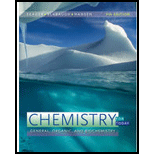
Study Guide with Student Solutions Manual for Seager/Slabaugh/Hansen's Chemistry for Today: General, Organic, and Biochemistry, 9th Edition
9th Edition
ISBN: 9781305968608
Author: Spencer L. Seager, Michael R. Slabaugh, Maren S. Hansen
Publisher: Cengage Learning
expand_more
expand_more
format_list_bulleted
Textbook Question
Chapter 11, Problem 11.46E
Draw the structural formulas corresponding to each of the following IUPAC names:
a. ethylcyclobutane
b.
c.
Expert Solution & Answer
Trending nowThis is a popular solution!

Students have asked these similar questions
How should I graph my data for the Absorbance of Pb and Fe for each mushroom? I want to compare the results to the known standard curve.
Software: Excel Spreadsheets
Link: https://mnscu-my.sharepoint.com/:x:/g/personal/vi2163ss_go_minnstate_edu/Eb2PfHdfEtBJiWh0ipHZ_kkBW4idWWwvpLPPtqoq2WkgbQ?rtime=HxrF0_tR3Ug
Provide the proper IUPAC name only for the following
compound. Dashes, commas, and spaces must be used
correctly, but do not use italics in Canvas.
The kinetics of a gas phase reaction of the form A → Products results in a rate constant of 0.00781 M/min. For this reaction, the initial concentration of A is 0.501 M. How many minutes will it take for the concentration of A to reach 0.144 M
Chapter 11 Solutions
Study Guide with Student Solutions Manual for Seager/Slabaugh/Hansen's Chemistry for Today: General, Organic, and Biochemistry, 9th Edition
Ch. 11 - Prob. 11.1ECh. 11 - Prob. 11.2ECh. 11 - Prob. 11.3ECh. 11 - Prob. 11.4ECh. 11 - Prob. 11.5ECh. 11 - Prob. 11.6ECh. 11 - Prob. 11.7ECh. 11 - Prob. 11.8ECh. 11 - Prob. 11.9ECh. 11 - Prob. 11.10E
Ch. 11 - Prob. 11.11ECh. 11 - Prob. 11.12ECh. 11 - Prob. 11.13ECh. 11 - Prob. 11.14ECh. 11 - What molecular geometry exists when a central...Ch. 11 - Compare the shapes of unhybridized p and...Ch. 11 - Use Example 11.1 and Tables 11.2 and 11.6 to...Ch. 11 - Prob. 11.18ECh. 11 - Prob. 11.19ECh. 11 - Prob. 11.20ECh. 11 - Prob. 11.21ECh. 11 - Prob. 11.22ECh. 11 - Prob. 11.23ECh. 11 - Write a condensed structural formula for the...Ch. 11 - Write a condensed structural formula for the...Ch. 11 - Write an expanded structural formula for the...Ch. 11 - Prob. 11.27ECh. 11 - Classify each of the following compounds as a...Ch. 11 - Why are different conformations of an alkane not...Ch. 11 - Which of the following pairs represent structural...Ch. 11 - Prob. 11.31ECh. 11 - Prob. 11.32ECh. 11 - Identify the following alkyl groups: a. b....Ch. 11 - Prob. 11.34ECh. 11 - Prob. 11.35ECh. 11 - Draw a condensed structural formula for each of...Ch. 11 - Prob. 11.37ECh. 11 - Prob. 11.38ECh. 11 - Prob. 11.39ECh. 11 - Prob. 11.40ECh. 11 - The following names are incorrect, according to...Ch. 11 - The following names are incorrect, according to...Ch. 11 - Prob. 11.43ECh. 11 - Write the correct IUPAC name for each of the...Ch. 11 - Write the correct IUPAC name for each of the...Ch. 11 - Draw the structural formulas corresponding to each...Ch. 11 - Prob. 11.47ECh. 11 - Which of the following pairs of cycloalkanes...Ch. 11 - Prob. 11.49ECh. 11 - Prob. 11.50ECh. 11 - Prob. 11.51ECh. 11 - Which of the following cycloalkanes could show...Ch. 11 - Prob. 11.53ECh. 11 - Using the prefix cis- or trans-, name each of the...Ch. 11 - Prob. 11.55ECh. 11 - The compound decane is a straight-chain alkane....Ch. 11 - Explain why alkanes of low molecular weight have...Ch. 11 - Suppose you have a sample of 2-methylhexane and a...Ch. 11 - Identify circle the alkanelike portions of the...Ch. 11 - Prob. 11.60ECh. 11 - Prob. 11.61ECh. 11 - Write a balanced equation for the incomplete...Ch. 11 - Prob. 11.63ECh. 11 - Prob. 11.64ECh. 11 - Prob. 11.65ECh. 11 - Prob. 11.66ECh. 11 - Prob. 11.67ECh. 11 - Prob. 11.68ECh. 11 - Would you expect a molecule of urea produced in...Ch. 11 - Prob. 11.70ECh. 11 - Prob. 11.71ECh. 11 - Prob. 11.72ECh. 11 - Prob. 11.73ECh. 11 - Prob. 11.74ECh. 11 - Prob. 11.75ECh. 11 - A semi-truck loaded with cyclohexane overturns...Ch. 11 - Prob. 11.77ECh. 11 - Oil spills along coastal shores can be disastrous...Ch. 11 - Prob. 11.79ECh. 11 - Prob. 11.80ECh. 11 - Use the generic formula for alkanes (CnH2n+2) to...Ch. 11 - Prob. 11.82ECh. 11 - Which of the following is an example of an alkane?...Ch. 11 - Prob. 11.84ECh. 11 - Prob. 11.85ECh. 11 - Prob. 11.86ECh. 11 - The deadly property of carbon monoxide, if...
Knowledge Booster
Learn more about
Need a deep-dive on the concept behind this application? Look no further. Learn more about this topic, chemistry and related others by exploring similar questions and additional content below.Similar questions
- The reaction of 2-oxacyclopentanone with hydrochloric acid in water (i.e., "excess") produces which of the following carboxylic acids?arrow_forwardDon't used hand raiting and don't used Ai solutionarrow_forwardWhat is the name of the major product formed during the reaction between benzoyl chloride and phenol? benzyl ester O phenyl benzoate ○ cyclopentanoate ○ benzyl phenoate ○ benzenecarboxylic acidarrow_forward
- Provide the proper IUPAC or common name for the following compound. Dashes, commas, and spaces must be used correctly.arrow_forwardProvide the proper IUPAC name (only) for the following compound. Dashes, commas, and spaces must be used correctly. HO. OHarrow_forwardQuestion 2 0/1 pts Provide the proper IUPAC name only for the following compound. Dashes, commas, and spaces must be used correctly. HO CH 3 1-methyl-1-cyclohexanecarboxylic acidarrow_forward
arrow_back_ios
SEE MORE QUESTIONS
arrow_forward_ios
Recommended textbooks for you
 Chemistry: Matter and ChangeChemistryISBN:9780078746376Author:Dinah Zike, Laurel Dingrando, Nicholas Hainen, Cheryl WistromPublisher:Glencoe/McGraw-Hill School Pub Co
Chemistry: Matter and ChangeChemistryISBN:9780078746376Author:Dinah Zike, Laurel Dingrando, Nicholas Hainen, Cheryl WistromPublisher:Glencoe/McGraw-Hill School Pub Co Chemistry for Today: General, Organic, and Bioche...ChemistryISBN:9781305960060Author:Spencer L. Seager, Michael R. Slabaugh, Maren S. HansenPublisher:Cengage Learning
Chemistry for Today: General, Organic, and Bioche...ChemistryISBN:9781305960060Author:Spencer L. Seager, Michael R. Slabaugh, Maren S. HansenPublisher:Cengage Learning


Chemistry: Matter and Change
Chemistry
ISBN:9780078746376
Author:Dinah Zike, Laurel Dingrando, Nicholas Hainen, Cheryl Wistrom
Publisher:Glencoe/McGraw-Hill School Pub Co


Chemistry for Today: General, Organic, and Bioche...
Chemistry
ISBN:9781305960060
Author:Spencer L. Seager, Michael R. Slabaugh, Maren S. Hansen
Publisher:Cengage Learning
07 Physical Properties of Organic Compounds; Author: Mindset;https://www.youtube.com/watch?v=UjlSgwq4w6U;License: Standard YouTube License, CC-BY